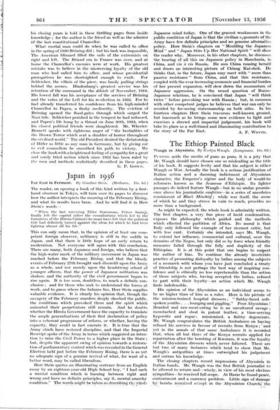Japan in 1936
Far East in Ferment. By Gunther Stein. (Methuen. 10s. 6d.)
The reader, on opening a book of this kind written by a first- hand observer in Tokyo, will turn over its pages to discover how the author interprets the meaning of the February Rising, and what its results have been. And he will find it in Herr Stein's words-
" When the last surviving Elder Statesman, Prince Saionji, finally left the capital (after the consultations which led to the formation of the Hirota Cabinet) he must have felt that the political tide had definitely turned against the ideas for which he had been fighting almost all his life."
This can only mean that, in the opinion of at least one com- petent foreign observer, militancy is still in the saddle in Japan, and that there is little hope of an early return to moderation. Not everyone will agree with this conclusion.
There are many, both Japanese and foreign, who believe that the high-water mark of the military movement in Japan was reached before the February Rising, and that the bloody events of February 27th brought such discredit upon the Army as a whole, and not merely upon the headstrong school of younger officers, that the power of Japanese militarism was shaken, and the authority of the civil government began to rise again. It is too soon, doubtless, to reach a definite con- clusion ; and for those who seek to understand the forces at work, and to guess where the balance lies, Herr Stein supplies valuable evidence. It is clearly his opinion that, though the savagery of the February murders deeply shocked the public, the conditions which provoked them and the spirit which animated their perpetrators still remain. And he doubts whether the Hirota Government have the capacity to translate the ample generalisations of their first declaration of policy into a coherent programme of reform, or whether, having the capacity, they could in fact execute it. It is true that the Army chiefs have restored discipline, and that the Imperial Rescript spoke of the Army in terms which suggested an inten- tion to raise the Civil Power to a higher place in the State ; but, despite the apparent swing of opinion towards a restora- tion of parliamentary control which was revealed in the General Election held just before the February Rising, there is as yet
no adequate sign of a genuine revival of what, for want of a better word, may be called liberalism.
Herr Stein quotes an illuminating sentence from an English essay by an eighteen-year-old High School boy, " I had such a mental condition which is buzzing between right and wrong and have no definite principles, say it, mental anarchy condition" The words might be taken as describing the Whole
Japanese mind today. One 'of the:gravest weaknesses in the public condition of Japah is that the civilian opponents of the Ahoy have few definite principles and no genuine alternative policy. Herr Stein's chapters on " Moulding the Japanese Mind " and " Japan Stirs Up Her National Spirit " will show the reader why. Moreover, in his other chapters, he discuSses the bearing of all this on Japanese policy in Manchuria, in China, and visa via Russia. He sees China rousing herself and draws an interesting picture of Chiang Kai-shek. He thinks that, in the future, Japan may meet with " more than paisive resistance " from China, and that this resistance, coupled with the ever-increasing economic and financial burden of her present expansion, will slow down the momentum of Japanese aggression. On the vexed question of Raiso- Japanese relations, he is convinced that Japan " will think twice " before provoking war with Russia ; but, in common with other competent judges he believes that war can only be avoided by far-seeing statesmanship on both sides. In his fourteen chapters Herr Stein traverses well-known ground, but inasmuch as he brings some new evidence to light and exercises a shrewd and impartial judgement, his book will take its place as a well-timed and illuminating contribution to














































 Previous page
Previous page